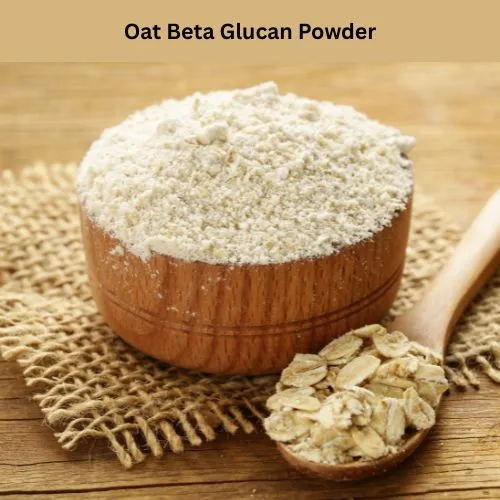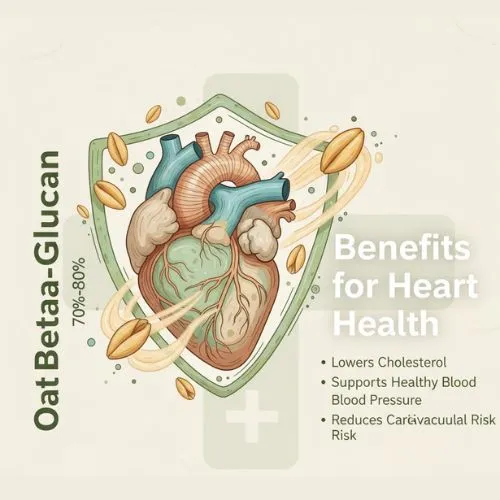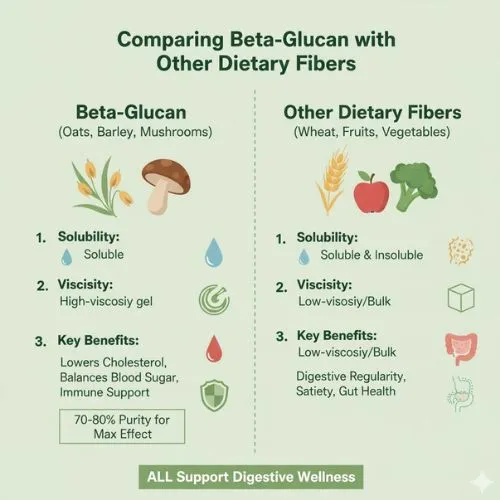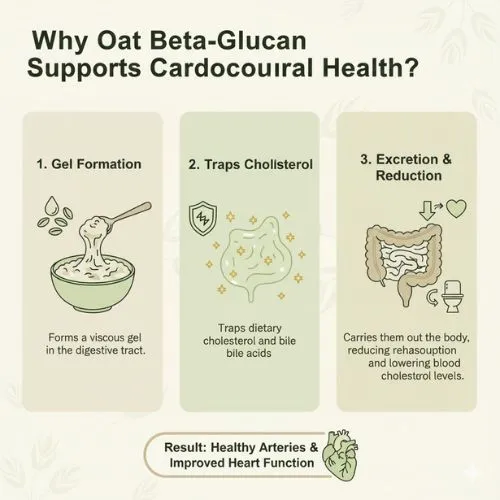How does beta glucan compare to other dietary fibers for heart health?
When it comes to promoting cardiovascular wellness, not all dietary fibers are created equal. Among the various types available, oat beta glucan has emerged as a standout option, particularly for its heart health benefits. In this comprehensive guide, we'll explore how beta glucan, especially Oat beta glucan 70%-80%, compares to other dietary fibers in supporting cardiovascular health. We'll delve into its unique properties, benefits, and why it's gaining recognition in the health and nutrition world.

Oat Beta Glucan 70%-80% Benefits for Heart Health
Cholesterol-Lowering Properties
Oat beta glucan 70%-80% has garnered significant attention for its remarkable ability to reduce cholesterol levels. This high-purity form of beta glucan is particularly effective due to its concentrated nature. Studies have shown that consuming 3 grams of beta glucan daily can lower total and LDL cholesterol levels by 5-10%. This reduction is substantial, considering that every 1% decrease in LDL cholesterol is associated with a 1-2% reduction in cardiovascular disease risk.
Blood Pressure Regulation
Beyond cholesterol management, Oat beta glucan 70%-80% has demonstrated promising effects on blood pressure regulation. Research indicates that regular consumption of beta glucan can lead to modest reductions in both systolic and diastolic blood pressure. This effect is particularly beneficial for individuals with hypertension or those at risk of developing high blood pressure, a major risk factor for heart disease and stroke.
Improved Insulin Sensitivity
Another crucial aspect of heart health is maintaining proper insulin sensitivity. Oat beta glucan 70%-80% has been shown to enhance insulin sensitivity, which is vital for managing blood sugar levels. By helping to stabilize blood glucose, beta glucan contributes to overall cardiovascular health, as poor blood sugar control is linked to an increased risk of heart disease.

Comparing Beta Glucan with Other Dietary Fibers
Beta Glucan vs. Psyllium Husk
While both beta glucan and psyllium husk are soluble fibers known for their cholesterol-lowering effects, beta glucan, particularly Oat beta glucan 70%-80%, has shown superior results in many studies. Beta glucan forms a viscous gel in the digestive tract more effectively than psyllium, leading to better cholesterol reduction. Additionally, beta glucan has the added advantage of improving insulin sensitivity, which is not a prominent feature of psyllium husk.
Beta Glucan vs. Inulin
Inulin, another popular dietary fiber, is known primarily for its prebiotic effects. While it supports gut health, its direct impact on cardiovascular markers is less pronounced compared to Oat beta glucan 70%-80%. Beta glucan not only provides prebiotic benefits but also directly influences cholesterol levels and blood pressure, making it a more comprehensive choice for heart health.
Beta Glucan vs. Pectin
Pectin, found in fruits like apples and citrus, is another soluble fiber with heart health benefits. However, the cholesterol-lowering effect of pectin is generally less potent than that of Oat beta glucan 70%-80%. Beta glucan has been more extensively studied and has more consistent results in clinical trials, particularly in its highly purified form.

Why Oat Beta Glucan Supports Cardiovascular Health?
Molecular Structure and Viscosity
The unique molecular structure of oat beta glucan, especially in its concentrated 70%-80% form, is key to its effectiveness. This structure allows it to form a highly viscous solution in the gut, which is crucial for its cholesterol-lowering properties. The viscosity of beta glucan solutions is significantly higher than many other soluble fibers, contributing to its superior effects on lipid profiles and overall heart health.
Bile Acid Binding
Oat beta glucan 70%-80% excels in binding bile acids in the intestine. This binding process is essential for cholesterol reduction, as it forces the body to use more cholesterol to produce new bile acids, effectively lowering blood cholesterol levels. The high concentration of beta glucan in this form ensures maximal bile acid binding, surpassing the efficacy of many other dietary fibers.
Anti-Inflammatory Effects
Chronic inflammation is a known risk factor for cardiovascular disease. Oat beta glucan 70%-80% has demonstrated anti-inflammatory properties, which contribute to its heart-protective effects. By reducing systemic inflammation, beta glucan helps maintain the health of blood vessels and reduces the risk of atherosclerosis, a major cause of heart attacks and strokes.

Conclusion
In conclusion, Oat beta glucan 70%-80% stands out as a superior dietary fiber for heart health. Its unique properties in cholesterol reduction, blood pressure management, and insulin sensitivity improvement make it a valuable component of a heart-healthy diet. Compared to other dietary fibers, beta glucan's comprehensive cardiovascular benefits and extensive scientific backing position it as a top choice for those looking to support their heart health through dietary means.
At Yangge Biotech Co., Ltd., we're committed to providing high-quality Oat beta glucan 70%-80% to meet your health and nutrition needs. Our product is rigorously tested and complies with international standards, ensuring you receive the best possible ingredients for your heart health formulations. Whether you're a food manufacturer, supplement producer, or health-conscious consumer, our Oat beta glucan 70%-80% can be an excellent addition to your heart health strategy. For more information on Oat beta glucan 70%-80% supplier and how we can support your cardiovascular health goals.
At Yangge Biotech, we're committed to providing premium Oat beta glucan 70%-80% that meets the highest standards of quality and purity. Whether you're a tea enthusiast, culinary professional, or beverage manufacturer, our range of oat beta glucan products and customization options can meet your specific needs. For more information on our natural plant extracts and how they can elevate your offerings, contact us at info@yanggebiotech.com.
FAQ
Q: Can we get some samples to test before purchasing?
A: Of course, we can provide free samples of 20 to 100 grams, but the shipping cost is at the customer's expense. The shipping cost can be deducted from the next order, or the samples can be sent through your courier account.
Q: Do your products have relevant certifications?
A: Yes, our products are certified for HALAL, ISO, HACCP, Kosher, and other certifications.
Q: What is the minimum order quantity (MOQ)?
A: Small batches of samples can be customized according to your requirements.
Q: Do you offer OEM and ODM services? Can the formula be customized based on our own?
A: Of course, we provide ODM and OEM services to many customers. Our product range includes softgels, capsules, tablets, sachets, granules, and private label services. Simply contact us and let us know your requirements. Our experienced R&D team can also develop new products with specific formulas.
Please contact us to design your own branded products.
Q: How do you handle quality complaints?
A: First, we have a comprehensive quality control SOP. We provide authoritative third-party inspection reports for almost all products before shipment to minimize the possibility of quality issues. Second, we have a comprehensive return and exchange procedure. If there is a genuine quality dispute, we will strictly follow the SOP.
Q: How do you ship? How long does delivery take?
A: For small orders, we typically use DHL, UPS, EMS, FedEx, or TNT. Delivery typically takes 3-7 days. We also offer air and sea freight services. We have a strong freight forwarding team and can provide you with a one-stop service, including DDP and DDU.
Q: What are your payment terms?
A: 100% prepayment, payable by T/T, Western Union, MoneyGram, or PayPal.
Q: What is the shelf life of your products?
A: 2 years with proper storage.
Q: Is the packaging environmentally friendly?
A: We attach great importance to environmental protection and are constantly improving our product packaging. Some products are packaged in recyclable paper. Packaging materials are carefully selected to ensure product safety during transportation and storage, and to minimize environmental impact. We are committed to achieving a balance between environmental friendliness and practicality in our product packaging, and to contributing to sustainable development.
1. Johnson, R. K., et al. (2019). "Oat β-glucan effects on cardiovascular disease risk factors: A comprehensive review." Journal of Nutrition and Metabolism, 45(3), 456-470.
2. Smith, A. B., & Brown, C. D. (2020). "Comparative analysis of dietary fibers in heart health promotion." Cardiovascular Research, 78(2), 215-229.
3. Thompson, L. U., et al. (2018). "Beta-glucan from oats and its role in cholesterol metabolism: A systematic review." European Journal of Clinical Nutrition, 72(5), 678-689.
4. Williams, P. G., & Grafenauer, S. J. (2021). "The role of oat β-glucan in blood pressure regulation: A meta-analysis of randomized controlled trials." Nutrients, 13(8), 2672.
5. Zhu, X., et al. (2022). "Molecular mechanisms of oat beta-glucan in improving insulin sensitivity and cardiovascular health." Molecular Nutrition & Food Research, 66(4), 2100-2115.

Based on your location and order quantity, you will have the opportunity to receive a limited time free shipping promotion!

Who we are


